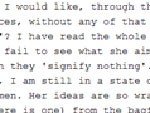
These letters to and from ‘Polly Plum’ (Mary Ann Colclough) appeared in the New Zealand Herald on 16 and 18 August 1871. This transcript is taken from C. Macdonald (ed.), The vote, the pill and the demon drink: a history of feminist writing in New Zealand, 1869–1993, Bridget Williams Books, Wellington, 1993.
Questions for Polly Plum by Jellaby Pater (1871)
SIR, – I would like, through the medium of your columns, to ask 'Polly Plum' to state in a few short petty sentences, without any of that circumlocution which characterises her letters, what she demands as 'Women's rights'? I have read the whole of the controversy (?) between her and her various correspondents, but as yet fail to see what she aims at. Her letters to me are 'full of sound and fury', but after reading them through they 'signify nothing'. After patiently reading everything emanating from her during the past six months, I am still in a state of blissful ignorance as to the nature of the so-called 'rights' she claims for women. Her ideas are so wrapt up in a cloud of words that it is impossible to sift the grain of wheat (if there is one) from the bagful of chaff in which her letters are smothered. – Please answer the following questions seriatim: – 1st. What rights are they which 'P. P.' desires for women? 2nd. Has not woman a perfectly legal right under the present law to protect her own property and secure it to herself by means of a marriage settlement? 3rd. On what does she ground her idea that women generally are dissatisfied with their present position? 4th. Setting aside the present agitators – Mill, Miss Nightingale, and others – that 'P. P.' is so fond of quoting, can she state on her veracity that she knows six married ladies in Auckland who are dissatisfied with their present legal position? 5th. Can 'P. P.' bring to bear any text of Scripture which is violated by the present legal position of women? In conclusion, I would again ask 'Polly Plum' to reply in terse sentences to these questions, to avoid circumlocution, far-fetched similes, and recondite allusions. – I am, &c,
JELLABY PATER
Answers to 'Jellaby Pater' by Polly Plum (1871)
SIR, – The enclosed are answers for 'Jellaby Pater', with 'Polly Plum's' compliments, hoping to see the day when he shall be added to the list of those who, while upholding Christianity, hate oppression. – I am, &c,
POLLY PLUM
Wednesday, August 16, 1871.
1st. The right, as thinking, reasoning beings, to decide for themselves what is best for their own happiness. If they were satisfied with man's decision, this agitation for change would not be.
2nd. A woman can only protect property she has before marriage. Men, unless proved bad and incapable, can claim all property and earnings after marriage. This the writer has experienced, her husband – not a bad, but a thoroughly unbusinesslike, unenergetic man – spent pounds and pounds of his wife's earnings in profitless, and even in ruinous speculations, and on one occasion all the little home comforts she had gathered around her, by unremitting toil, were seized through some of his mistakes, and she and two little children, the eldest not two years old, were left on the bare floor.
3rd. The immense movement in favour of a change answers that question.
4th. On my veracity, 75 per cent of my married lady friends are opposed to the present law, many of them happy enough themselves but knowing of wrongs, evils, and injustice that make them in favour of 'woman's rights'. My experience in Auckland – for I have had no experience in these matters elsewhere – goes to prove that young single ladies are those who are most opposed to the new view, their ideas of marriage being simply ideal, and that married ladies are not always sincere with their husbands in this matter. It is not to their interests to be so. They offend their husband, make domestic broils, and can at present gain nothing, and lose much comfort. Thackeray, in Denis Duval, says, 'But you don't expect sincerity and subservience'.
5th. Christ's rule of life, 'Do unto others as ye would they should do unto you', and the whole spirit of Gospel doctrine, is opposed to arbitrarily deciding for anybody what is best for them.
[We think it but fair to publish our fair correspondent’s reply. The correspondence is now closed. – Ed. N.Z.H.]

Community contributions